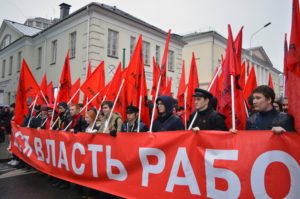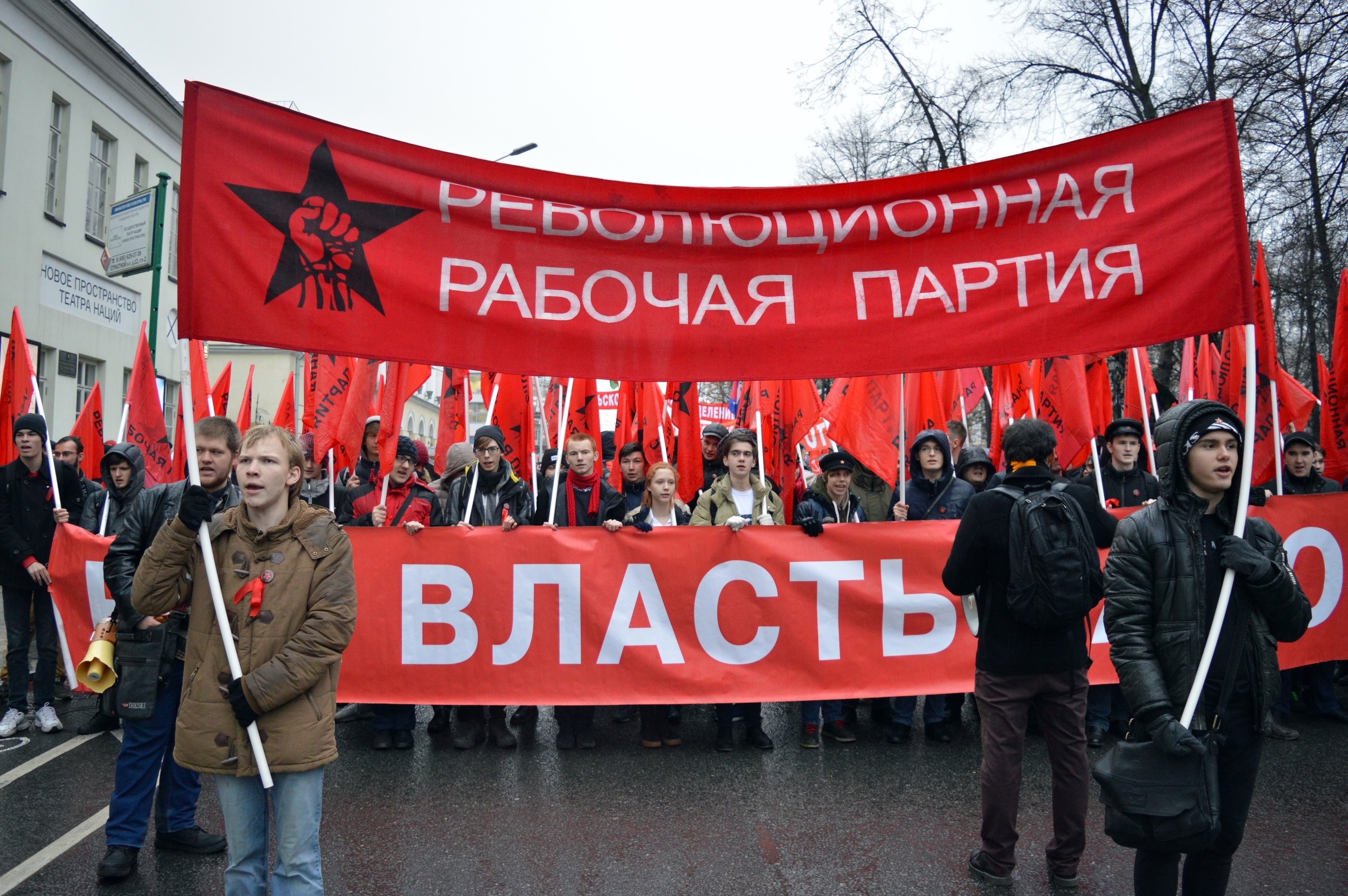From Democracy to Revolution
By Mikhail Komrakov and Semyon Kozyrev
Last Saturday, there were demonstrations in over a hundred towns and cities around Russia, in support of the anti-corruption campaign of oppositionist Alexei Navalny, but there were wider issues involved in the protests, not least the squeeze on workers’ living standards.
The following is a report from a member of the Revolutionary Workers’ Party, which participated in those protests.
On Saturday, all around the country, a wave of meetings and demonstrations took place, occasionally breaking out into open confrontations with the police. Tens of thousands of people came out. Over three thousand were arrested, including some of our comrades. Despite the combined efforts of the authorities and the liberal opposition, to portray the events simply as actions in support of Navalny, this is not what happened.
Disastrous anti-Covid policies
The demonstrations are mainly due to the economic crisis and the government’s disastrous anti-coronavirus policies. It is also necessary to note that Navalny is only the apparent leader of the protests. It is ‘apparent’ in the sense that a large part of the protestors do not care about him personally; they are turning out to fight against the pressure of the deteriorating reality around them, the trigger for which was by no means just his arrest but the publication of a video about an opulent palace built for Putin, which has attracted over 80 million views. This shows the unprecedently vile theft of the current government. The effect of such material is class hatred of the rich capitalists and oligarchs who have robbed the country.
This is the second time that Navalny has produced a video that has sent shockwaves around the Russian internet. The first time was when he showed a video entitled “He is not Dimon to you” about Dmitry Medvedev, former President, who was Prime Minister back in 2017. The current protests are similar to those of 2017 but bigger. Discontent over these issues has been accumulating for a year now and finally found an opening, despite all the restrictions and bans on public meetings that the authorities have loudly proclaimed. The revelations about the wealth that Medvedev had amassed led to protests back then.
This anger came out onto the streets like in 2017, but much wider. Previously apolitical layers of the population besides the traditional liberal-bohemian audience of Navalny, have been involved and this is why we took part in the events.

Moscow de-industrialised over years
In Moscow, the picture was less inspiring. Here, the crowds who were protesting were immediately split up by the police and were methodically dispersed, despite their attempts at resistance. Here, in contrast to the provinces, the traditional liberal crowd is much bigger, but is nevertheless incapable of much organised and active resistance. Years of deindustrialisation of Moscow has facilitated the atomisation of the working class here and those isolated workers who did participate were immersed in the general mass of liberals, students, and more middle-class people. The attitude of protestors towards us was also varied; some were supportive, others critical, while still others were surprised for the first time at seeing the left, carrying red banners, at such an event.
Regarding the perspectives of the unfolding movement, it looks like the narrow capitalist framework of the general, democratic demands coming from the liberal organisations and Navalny will lead to a dead-end. But there is the potential to build the movement by widening its roots among the working class by advancing a socialist programme of demands.
On one hand, it is clear that the liberal opposition leadership are capable of neither organisation nor implementing their demands. On the other hand, the participation in the movement of the working class and its organisations could guarantee, not only the implementation of the general democratic demands that the liberal opposition have raised, but they can bring forward working-class demands, like nationalisation, workers’ control, and so on. We feel it is our task as socialists is to argue for the participation of workers in the protests and to campaign within the opposition protest movement for a socialist agenda.

Search for a ‘progressive’ answer
Some commentators describe the current situation as simply a choice between Putin and Navalnyi. Others view it as the search for a ‘progressive’ answer to a reactionary government. But I believe that we, the RWP, and the masses of workers who are entering this movement, can achieve ‘progress’ and deliver democratic reforms, only by channelling the movement in the direction of the socialist revolution.
Tens of thousands of people around the country are participating in these protests because they are totally disillusioned by the socio-economic reality that surrounds them. They intuitively feel that it is necessary to protest and change the existing order. But for real change, protest alone is not sufficient: there need to be concrete demands to achieve changes that lead to the destruction of a completely rotten system. We need to establish in its place a fundamentally new system, in which welfare and society flourish for all working people, those whose living standards have fallen sharply, and not only for a handful of exploiters and their lackeys.
Not an issue of personalities
Navalny is not capable of providing such demands. The problems that have been correctly identified by him relate mostly to the personal characteristics of individuals and he makes largely cautious criticism of the system as a whole. The systematic ‘solutions’ from the man who the West call “Russia’s main opposition leader”, relate only to the creation of yet more state organs against corruption – as if there were too few of them as it is. He also seeks the substitution of old and outrageously indecency decadent bureaucratic snouts by newer ones: more civil servants who have yet to start out on their insatiable feasting from the state trough.
This is precisely why it is important to present a socialist programme for change. We will therefore be putting forward our own socialist demands to protestors where we can:
1.The release of all political prisoners.
2.The disbandment of the FSB and the police; to be replaced with a people’s militia formed by ordinary workers.
3.The complete nationalisation of medicine. A significant increase in spending on medicine. The right of every person, including migrants, to free and good-quality medical care. A complete rejection of the principle of medical insurance and the return to budget financing.
4.The end of all measures connected with Covid-19 or other justifications that are directed to restricting political freedoms.
5.The introduction of strict workers’ control over bureaucrats and the management of enterprises. The reduction in the wages of bureaucrats to the average level of wages. The complete abolition of commercial secrets.
6.The establishment of a state monopoly of foreign trade and the nationalisation of all industrial enterprises and big retail companies.
7.The nationalisation of all banks and their unification in a central state bank. An increase in financial investment in the real sector of the economy.
8.The establishment of a progressive taxation system and the abolition of indirect taxes.
9.The guarantee of wages indexed to inflation, unemployment benefits, pensions and stipends at no less than the average level of wages.
10.The complete annulling of all consumer credits (including mortgage re-payments) and council tax debts.
11.Solving the housing question via the full nationalisation of building companies and the housing sector that is currently on the books of commercial companies, the allocation of housing for working people, including migrants. Offering rentable housing to people who are at risk from Covid.
12.The introduction of a seven-hour working day and a working week of 35 hours, as a means to ending unemployment; offering every unemployed person the right to take part in public works on an average wage.
13.The reduction in the pension age to 55 years.
Long live the socialist revolution! All power to the workers! Victory will be ours!
January 27, 2021



